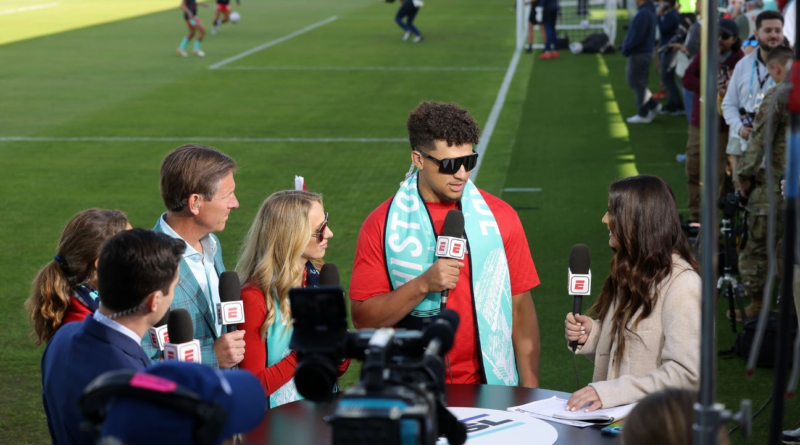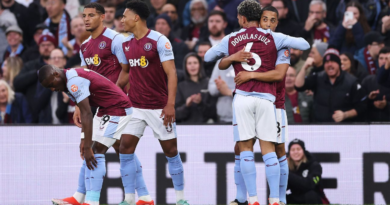The NWSL has more billionaire owners than ever. Is that enough to hit the next level?
Laura Ricketts and her fellow Chicago Red Stars investors are trying to figure out where and how they can build a dedicated training facility and stadium somewhere within Chicago city limits — ideally, anyway.
Chicago’s ownership group, led by Ricketts, purchased the team for $35.5 million last August and promised another $25.5 million in immediate investments for the historically underfunded team. The money that they are willing to pour into the Red Stars will easily add up to another nine figures if a new stadium is built.
“We knew right from the beginning — like, rewind back almost a year and a half ago when we started considering acquiring the Red Stars — we knew that the current [stadium] situation was not the ultimate long-term solution,” Ricketts told ESPN last week. “And really, the key to unlocking the door for this organization would be to solve that.”
The Red Stars’ drastic turn of fortune from one of the NWSL‘s most troubled franchises is a microcosm for the league: there’s more money fueling the league than ever before and, while it won’t solve the NWSL’s problems overnight, there’s new hope that no challenge is insurmountable.
• Stream on ESPN+: NWSL, LaLiga, FA Cup & more (U.S.)
Almost every team in the NWSL has new ownership or major investors who joined in the past four years, leading to an influx of billionaire ownership groups with major-league experience and deeper pockets than the league has ever had access to before. With this new billionaire class of owners, the league is undergoing a transformation — at least, that’s the plan.
From the Chicago Cubs to the NY Giants, new-look NWSL owners arrive
The NWSL is no longer the lean operation it was when it launched in 2013. To achieve its goals of being the best women’s league in the world and a leading U.S. sports property, it has needed the deeper level of investment that has been arriving only recently.
“We are not sitting here today saying, ‘Is this thing still gonna be around a year from now?’ which I think is a very different mindset maybe than the past,” NJ/NY Gotham FC lead owner and league board governor Carolyn Tisch Blodgett recently told ESPN.
If the Ricketts and Tisch family names sound familiar to sports fans, they should. The Ricketts family, including Laura, owns the Chicago Cubs. Tisch Blodgett, who bought into Gotham last year ahead of the team’s first NWSL championship, is of the Tisch family that owns the New York Giants.
The Cubs and the Giants are each valued in the billions, and each of those families has the necessary sports experience and local relationships to get things done — like building a stadium, for example — in a way that even the average millionaire might not.
Over the past four years, all but one team — the North Carolina Courage — has turned over majority ownership or joined the league as a new team. In just about every case, they have been splashy, high-profile additions.
“From when we joined the league and even the conversations before, to now, the mindset around desire to invest, desire to see growth, how to achieve excellence, it’s wildly different,” said Kansas City Current co-owner Chris Long, who sits on the NWSL’s expansion committee and co-founded the Current in late 2020 with his wife, Angie, and Brittany Mahomes.
“There has been a sea change, and it’s exciting,” he added. “There’s a lot of well-intentioned, well-capitalized people that have gotten involved of late over our four seasons, and then secondarily, a lot more people at the door.”
Those people “at the door” are a dozen prospective ownership groups vying for the rights to the league’s 16th franchise.
The Longs — who founded Palmer Square Capital, a company that says it manages over $29 billion in investments — built the NWSL’s first purpose-built stadium for the Kansas City Current, a roughly $120 million investment that was mostly privately funded. Last week, the Current announced plans with Palmer Square Capital for $800 million in redevelopment of the downtown riverfront area around the team’s new stadium.
This NWSL season brought the arrival of expansion side Bay FC, backed by private equity firm Sixth Street, which says it manages over $75 billion in assets, and CEO Alan Waxman. San Diego Wave FC, which joined the NWSL for around $2 million ahead of its 2022 expansion season, is in the middle of a sale process to the Levine Leichtman family (also billionaires) that values the club between $113 million and $120 million.
1:13
NWSL commissioner plans to expand to 16 teams by 2026
NWSL commissioner Jessica Berman speaks to Seb Salazar about extending the league’s number of participating teams to 16 by 2026.
As recently as a few years ago, all of this — the wealthy investors, purpose-built stadiums, massive demand for expansion spots — was a ludicrous pipe dream for the NWSL. Kansas City lost its first NWSL team in late 2017 amid mismanagement and cash shortages. A few months later, the Boston Breakers folded, and the league contracted to nine teams. Gotham, formerly Sky Blue FC, drew global headlines in 2018 for having players take ice baths in trash cans, among other transgressions.
Commissioner Jessica Berman made it a point in her season-opening news conference to praise the owners that got the NWSL to where it is now. Many of them did the necessary work to build the foundation for the league while losing millions of dollars. Their efforts were not fruitless: they’ve created the type of thriving league they dreamed about over a decade ago, even if most are no longer directly involved.
More money doesn’t mean the NWSL won’t have new problems going forward, but the progress the league is making via its billionaire owners is beneficial on two levels. First, new owners investing in individual teams will better position them in their local markets, but then collectively it creates a more ambitious league board room that is ultimately deciding everything the NWSL does.
“It’s about understanding where the league fits in as well,” said Orlando Pride owner and chairman Mark Wilf, whose family purchased the Pride and MLS’ Orlando City in July 2021. “And growing a league sometimes means knowing how to balance your club and the league together to make the whole is greater than any individual part. I think that’s the kind of culture that you’re seeing at the NWSL. We have some very strong clubs — all clubs are growing but we ultimately grow to the maximum amount when the league is thriving.”
The NWSL: The smart new investment for billionaires?
The Wilf family brings its own big league experience to the NWSL as owners of the NFL’s Minnesota Vikings for nearly 20 years. They’ve invested money in technological upgrades that have improved the Orlando Pride game-day experience, which in turn contributed to the Pride’s paid attendance rising 64% year over year. Berman praised Wilf for a hands-on approach to the NWSL despite his many obligations. (Wilf spoke to ESPN in between his Vikings duties at the NFL draft last week.)
Wilf said that his direct involvement with the Pride is a testament to the growth state of the league, something he has experienced before in sports and other business. It is a common thread to the NWSL’s new wave of investors: They have emerged not solely out of their love for the game but because the NWSL now looks like a smart, early-stage investment that could yield long-term profits.
“I think the primary thread through all of them is that they’re investing in the league at a time when the expectations for the future are somewhat clear,” Berman told ESPN in a wide-ranging interview on campus.
“In the last year, we have been very transparent externally and internally that we are raising the bar and creating a standard of excellence in terms of the training and playing environment for players, in terms of what we expect from a business perspective. And so, what that should do — and I think it has done — is self-select people who have a shared vision of what that future could be and are prepared to make the investments and see this as a long-term enterprise value investment.”
Tension will always exist in a league board room filled with ideas and egos, but what had become a division of haves and have-nots in the league with existential issues only a few years ago has evolved into a group with first-world problems, such as what conditions should allow teams to opt to charter a flight to a game. None of that happens without an influx of money and ideas in every market.
Blodgett offers some simple yet illustrative examples, like with the hot-button issue of travel. With wealthier owners comes the cashflow to be able to book flights for almost the entire season up front once schedule drops at the beginning of the year, eliminating stress and the potential volatility of flight prices.
More tangibly, she has focused on marketing to a New York City metro area and media market that has relatively ignored Gotham, and on improving the game-day experience at Red Bull Arena, where Gotham averaged an underwhelming 6,300 fans per game last year.
To do that, Blodgett has implemented the “holy grail” of the tech world, the Net Promoter Score, or NPS, which measures customer satisfaction and retention. Gotham now boasts now a pregame fan fest, an in-game host to liven up the atmosphere, and improved fan gear kiosks at the stadium. She said Gotham scored a 79 NPS (on a scale of negative-100 to 100) for its Challenge Cup game last month, which she notes is a small sample size but an “incredible number.”
Some of Gotham’s new fan initiatives came following a staff member’s visit to an Angel City FC game to observe how that team creates arguably the best game-day experience in the league. The open-door collaboration has been a common theme for Angel City since it entered the league to immediate success in 2022, and it illustrates Berman’s implementation of more formal shared best practices league-wide.
Success is no longer isolated in the NWSL. For years, there were the Portland Thorns — who led the league in attendance every year for the first decade — and everyone else. Then there was Angel City and its 15,000 season tickets sold before playing a game in 2022, and the questions of whether that could be replicated.
The NWSL’s outlook has changed rapidly over the past two years, from the low point of a league-wide abuse scandal that halted the league and led to widespread reform measures. Externally, the growth is noticeable through big, new media rights deals, improved access to merchandise, and rising attendance figures. Those are the end products of decisions made behind the scenes by Berman leading a board of governors that looks completely different.
“It’s like from your mouth to the television,” Berman said of the speed of change, referencing her decade-plus at the NHL and how change can happen slowly at established organizations.
“We can make changes relatively quickly, so I think it attracts a certain kind of personality, someone who’s a little more risk tolerant, a little more interested in innovation, a little more nimble in thinking about how things have to be prescribed or not, and being comfortable with being part of the ebbs and flows of how we’re going to grow.”



